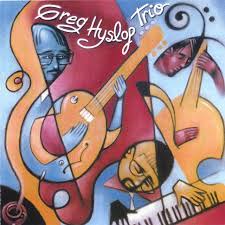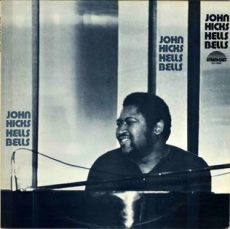
Daily Dose Of Jazz…
Pekka Eerik Juhani Sarmanto was born February 15, 1945 in Helsinki, finland. He first studied classical violin at the Sibelius Academy from 1958 to 1964 before switching to upright bass. He initially played dance music but was soon invited to perform in jazz clubs by bandleaders like Eero Koivistoinen and Esa Pethman.
1967 saw him joining the house band of Down Beat Club where he played with musicians like Ben Webster and Dexter Gordon. In 1975 Sarmanto founded UMO, abbreviation of Uuden Musiikin Orkesteri, (New Music Orchestra) and the group accompanied many international jazz musicians visiting Finland. As a result Pekka was able to meet and play with Charles Mingus in Belgrade, Serbia; Gil Evans, Edward Vesala and Sonny Rollins.
Sarmanto received the Georgie Award of the Finnish Jazz Federation in 1978. In 1982 he worked on the album To a Finland Station with Dizzy Gillespie and Arturo Sandoval, released on the Pablo label in 1983. He considers this to be his most successful recording.
In 1996 the bassist founded the Pekka Sarmanto Trio and in 2007 he retired from UMO but he still keeps performing actively with different groups, including with his own trio..
More Posts: bandleader,bass,history,instrumental,jazz,music

Daily Dose Of Jazz…
Niels Hartvig Foss was born on January 28, 1916 in Copenhagen, Denmark. He began playing guitar and from 1933 to 1934 began performing with the Svend Asmussen Group. He went on to play bass with Asmussen and others.
From 1940 to 1948 Niels led and played trombone in orxhestras and bands he formed. In 1949 for the next two years he performed with Peter Rasmussen and in 1957 moved to Switzerland where he continued to play part-time.
Over the course of his career Foss was a member of All Danish Starband, Etly Lizette And Her Orchestra, Kai Ewans Og Hans Orkester, Kaj Timmermann’s Septet, The Kordt Sisters Med Swingtet, and The Swingin’ Birds. He recorded for Odeon, His Master’s Voice, Imperial record labels.
Bassist, trombonist and guitarist Niels Foss died on May 16, 2018.
More Posts: bass,guitar,history,instrumental,jazz,music,trombone

Daily Dose Of Jazz…
Werner Dies was born on January 15, 1928 in Frankfurt, Germany. An autodidact on guitar and saxophone, he studied clarinet and composition starting in 1947. From 1947 to 1955 he played guitar in the dance band of Willy Berking, and was a member of the bands Hotclub Combo and Two Beat Stompers.
He led his own ensemble, went on a tour of Yugoslavia in 1955 and from 1955 to 1965 he was a member of Hazy Osterwald’s sextet, and also worked as a session musician and arranger. He toured with Joe Turner and, in 1968, Charly Antolini.
He had a hit in Germany in 1954 with Schuster bleib bei deinen Leisten (The Little Shoemaker) that spent eight weeks at #1 on the German hit parade starting in October 1954. He later worked for Howard Carpendale, Adam & Eve, Graham Bonney, and other singers, and produced easy listening music with his own ensemble, the Werner Dies Sax Band.
He wrote a treatise on clarinet improvisation that was published in 1967. He produced the group Bläck Fööss from 1973 to 2003. Tenor saxophonist, clarinetist, guitarist, composer, and arranger Werner Dies died on February 5, 2003.
More Posts: arranger,bandleader,clarinet,composer,guitar,history,instrumental,jazz,music,saxophone

Daily Dose Of Jazz…
Greg Hyslop was born in Montgomery, West Virginia on December 27, 1951 but grew up in Greensboro, North Carolina since 1957, He graduated from Berklee College of Music in Boston, Massachusetts in 1977 and returned to his hometown to settle down and raise a family.
With his hollow-bodied electric guitar, Hyslop performs straight ahead jazz with a bebop flavor. To date he has released two recordings, his debut with Kenny Werner on piano and John Riley on drums is titled Manhattan Date in 1987. His sophmore recording, The Greg Hyslop Trio features pianist David Fox and bassist Charles Gambetta.
Guitarist Greg Hyslop, who has been a member of the groups Peace Chant and The Third Floor Orchestra, continues to be a long standing member of the piedmont North Carolina jazz community.
More Posts: bandleader,guitar,history,instrumental,jazz,music

Daily Dose Of Jazz…
John Josephus Hicks Jr. was born December 21, 1941 in Atlanta, Georgia, the eldest of five children. As a child he moved around the United States as his father, Rev. John Hicks Sr, took up jobs with the Methodist church. His mother was his first piano teacher after he began playing at six or seven in Los Angeles, California. He took organ lessons, sang in choirs and tried the violin and trombone. Once he learned to read music around the age of 11, he started playing the piano in church.
His development accelerated once his family moved to St. Louis, Missouri when Hicks was 14 and he settled on the piano. Attending Sumner High School and played in schoolmate Lester Bowie’s band, the Continentals, which performed in a variety of musical styles. Hicks worked summer gigs in the southern United States with blues musicians Albert King and Little Milton with the latter providing his first professional work in 1958.
He studied music in 1958 at Lincoln University in Pennsylvania, where he shared a room with drummer Ronald Shannon Jackson. He also studied for a short time at the Berklee School of Music in Boston, Massachusetts before moving to New York in 1963.
In New York, John first accompanied singer Della Reese, then went on to play with Joe Farrell, Al Grey, Billy Mitchell, Pharoah Sanders, Jimmy Witherspoon, Kenny Dorham and Joe Henderson before joining Art Blakey’s Jazz Messengers in 1964. From 1965 to 1967 he worked on and off with vocalist Betty Carter, then joined Woody Herman’s big band, where he stayed until 1970, playing as well as writing arrangements for the band.
From 1972 to 1973, Hicks taught jazz history and improvisation at Southern Illinois University. From the 1970s onward he had a prolific career as a leader recording his debut in England followed by fifty-three more albums and as a sideman he recorded 300.
Towards the end of his life, he taught at New York University and The New School in New York. In 2006 John played in a big band led by Charles Tolliver, recorded his final studio album On the Wings of an Eagle.
Pianist, composer and arranger John HIcks, whose collection of papers, compositions, video and audio recordings are held by Duke University, died from internal bleeding on May 10, 2006.
More Posts: arranger,bandleader,composer,history,instrumental,jazz,music,piano




